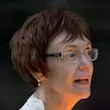Rebecca Chopp: First Collection 2013

President Rebecca Chopp joined Naudia Williams '14, Associate Dean of Diversity, Inclusion, and Community Development Liliana Rodriguez, and Associate Professor of Political Science Keith Reeves in welcoming the Class of 2017 to Swarthmore. Evoking the College's Quaker roots, this student-designed tradition is held during each new student orientation in the Scott Outdoor Amphitheater.
Audio Transcript
Good evening, everyone. In the Quaker tradition, we begin our gatherings with a moment of silence. This moment allows us to come fully into this space, to prepare ourselves to listen to others, and to center ourselves in the midst of this community. I would like to begin tonight's program by inviting you to join me in a moment of silence.
Hello, and welcome to First Collection. My name is Rebecca Chopp, and I'm the President of the College. Tonight is an opportunity for you to learn more about the Swarthmore community values and our Quaker heritage. You will hear words of welcome and reflection from several members of the Swarthmore community, including Naudia Williams, Class of 2014; Keith Reeves, associate professor of political science; and Liliana Rodriguez, associate dean of diversity, inclusion, and community development. Then our Dean of Students, Liz Braun, will initiate the candle lighting.
The tradition of Collection is almost as old as the College, though it has taken different forms over the years. According to Christopher Densmore, curator of Friends Historical Library, the annual catalog of 1870-1871 mentions a form of assembly at the end of each day for worship at which readings from Scripture were followed by a period of silence. Later catalog entries mention daily meetings for religious exercises and the "imparting of moral lessons as circumstances seem to require."
As the College became more secular, the collection format changed to include lectures, music, and theater. The other change involved the frequency of Collections which went from daily to a mandatory weekly collection, to the current tradition of a First Collection for incoming students and a Last Collection for graduating seniors.
Over the past several years, many students and community members have expressed an interest in having more regular Collections as an opportunity to bring the whole community together, and we are exploring ways to do so.
But this First Collection today represents your officially joining this community. You bring all your talents, interests, ideas, and, we hope, an open spirit to hear and learn of others' talents, interests, and ideas. Tonight you formally join Swarthmore. As you are undoubtedly beginning to learn, ours is a distinct community with values that hearken back to the Hicksite Quakers, the community of Quakers that founded Swarthmore College.
As you join this community, I would like to share a bit about our founders and what they dreamed of for this college. As we sit in this incredible canopy of trees, our founders are very much within the deep roots of this place. In 1853, the Hicksite Quakers formed a Committee on Education to explore how to provide higher education for their children. The Hicksites were a small but high-impact group of progressive religious activists. They were abolitionists, suffragists, and pacifists-and they were most especially radical thinkers. They wanted to make sure their children (and others) were nurtured in the context of Hicksite Quaker values and with the most rigorous possible intellectual and practical training. Today, the Quaker values of simplicity, rigorous examination of conscience, generous giving, social responsibility, and the peaceful resolution of conflicts are still very much in Swarthmore's educational bedrock and in our communal DNA. And the thirst for intellectual rigor is voracious and exhilarating.
The Hicksite Quakers were skeptical of the assumed "ways of the world" even as they devoted themselves to improving it. They were counter-cultural intellectuals devoted to improving the world by ameliorating the social ills (what we would call social responsibility and civic engagement), but also by educating people for professions including commerce, science, law, politics, and education. These Quakers, personified by individuals such as Lucretia Mott, founder of women's activism, were incredible community builders even as they cultivated individual freethinking and were incredibly suspicious of all dogmatism.
This amazing tradition-which I have seen no where else in all the communities of which I have been a part-continues, albeit in new ways, as we should expect. Most of us combine a healthy skepticism of the easily accepted ways of this world. We do not accept fads easily. We are creative thinkers for whom thinking outside the box is the acceptable path! But at the same time we question the acceptable ways of the world, we all have an intense devotion to living and building community. We care passionately and deeply about those with whom we live, be they fellow students, staff, faculty, or administrators. We care about the future of this community, be it by preserving the lovely landscape, determining which academic programs we need, or expanding access for even more students. Over the last several years, we have developed a plan for our future (lots of great changes), while at the same time we have had a vigorous debate about how we live as a diverse and inclusive community. It is a sign of hope-and one the founders would understand since they planned this school in the midst of the Civil War-when discussion and disagreement is seen as strength, not weakness. And you will find that many of our alumni nurture their communities and even build new ones as they create businesses and non-profits and careers in education, science, the arts, and policy that do good and do well, in the Quaker tradition, at the same time. And through our life together-here and in our alumni body-is a commitment to an abiding rigorous and creative intellectual life.
I invite you (and advise you) to celebrate, embrace, experiment, and practice the Swarthmore ethos of community building, counter-culturalism, and social responsibility. I am honored to welcome you to this long tradition of being counter-cultural intellectuals devoted to setting the world anew and aright in the context of building Swarthmore as an ever more flourishing, engaged, inclusive, and enjoyable community in which to live and learn.
Tonight you join Swarthmore, and Swarthmore, like the amphitheater, surrounds you. You will build this community even as you live within its values, norms, and practices. You belong to Swarthmore, but you are also now a steward of its legacy and a builder of its future. Welcome and embrace this most exciting period of growth and enrichment in your lives.
And now let me introduce you to Naudia Williams '14, our student speaker.






